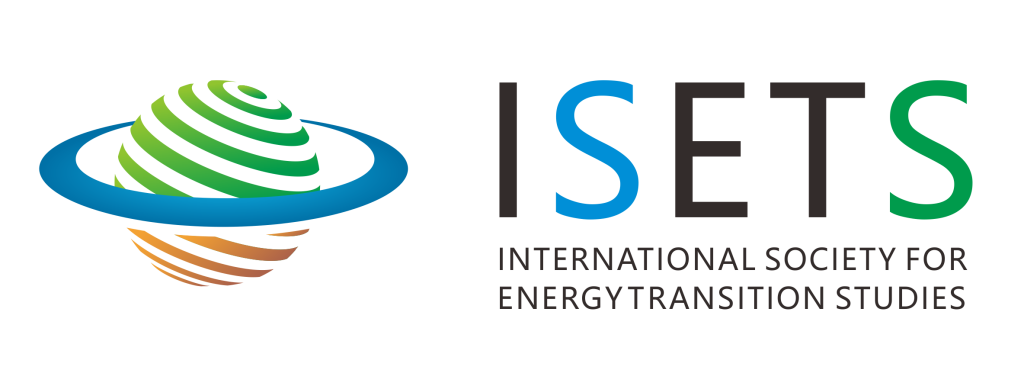The Third ISETS International Conference
“Geopolitics and Global Collaboration for Decarbonization”
28 November- 1 December 2025
University of Tokyo (Hongo Campus), Tokyo, Japan
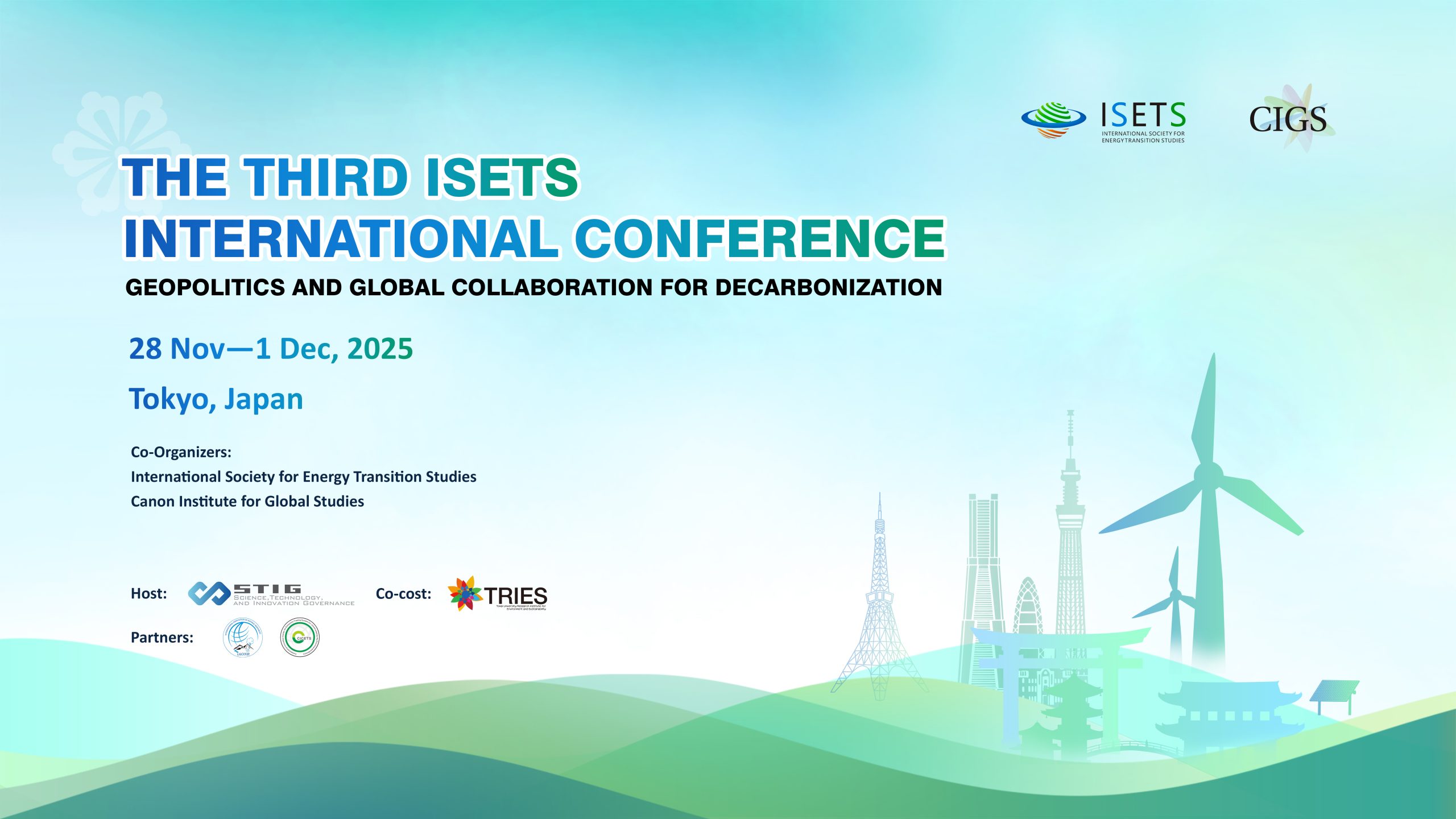
The International Society for Energy Transition Studies (ISETS) will organise its third international conference (ISETS2025 conference) on 28 November- 1 December 2025, in Tokyo. The conference is co-organised by Canon Institute for Global Studies (CIGS), hosted by Science, Technology, and Innovation Governance (STIG), GraSPP, The University of Tokyo, and co-hosted by Tokai University Research Institute for Environment and Sustainability (TRIES), Tokai University.
The conference will address critical issues in sustainable energy transition and the global response to climate change. Its goal is to facilitate a comprehensive dialogue on the intersection of energy policy, climate governance, and technological innovation by bringing together leading academics, analysts, policymakers, and industry experts. This conference aims to foster collaborative approaches and innovative solutions for a sustainable and equitable energy future in the context of global climate challenges.
Call for Special Concurrent Session proposals:
The ISETS2025 Conference is now accepting applications for “Special Concurrent Sessions.” Each session is approximately 100 minutes in duration and should include a minimum of 4 paper presentations. The session organizer or their team can present a maximum of 2 papers during the session. Session organizers will be responsible for promoting the workshop, selecting, and reviewing the final report papers.
Following the conclusion of the ISETS2025 conference, papers presented during the special concurrent sessions will be considered for publication in special issues.
Please send your proposal to events@isets.org; and isets2025@hotmail.com.
Proposals to organize Sessions should include the following information:
- The title of the Session
- The name, affiliation, mailing address and e-mail address(es) of the proposer(s)
- A description of the topic of the Session (not exceeding 100 words)
- A short description on the means of advertisement for the Session
- Paper title and authors
Call for papers:
Papers to be considered include but are not limited to the following list of topics:
- Energy transition economics, policy and finance
- Modelling and pathways to carbon neutrality
- Energy, carbon, electricity and stock markets
- Energy security, risks and economy
- Finance and investment
- Energy pricing and market dynamics
- Environmental impacts and governance, ESG
- Social impacts and management
- Innovation, Research & Demonstration
Organizers:
International Society for Energy Transition Studies (ISETS)
Canon Institute for Global Studies (CIGS)
Host:
Science, Technology, and Innovation Governance (STIG), GraSPP, The University of Tokyo, Tokyo, Japan
Co-Host:
Tokai University Research Institute for Environment and Sustainability (TRIES), Tokai University, Tokyo, Japan
Partners:
Collaborative Innovation Center for Emissions Trading System Co-Constructed by the Province and Ministry
International Association of Natural Resources (iAONR)
Honorary Conference Chairs
Nobuo Tanaka, Co-Chairman, ISETS; Executive Director Emeritus, International Energy Agency
Xiansheng SUN, Co-Chairman, ISETS; Former Secretary General, International Energy Forum, China
Conference Chairs
Xunpeng (Roc) SHI, ISETS President; Professor, University of Technology Sydney (UTS), Australia
Hisashi Yoshikawa, Project Professor, Graduate School of Public Policy (GraSPP) and Institute for Future Initiative (IFI), University of Tokyo
Scientific Committee
Chairs
Dayong ZHANG, Professor, Southwestern University of Finance and Economics, China
Fushuan WEN, Director of the Institute of Power Economics and Information, Zhengjiang University, China
Jinjun XUE, Professor and Director, Nagoya University and SinoCarbon Carbon Neutral Innovation Joint Laboratory
Members
Jun ARIMA, University of Tokyo, Japan
Weerawat CHANTANAKOME, Ministry of Energy, Thailand
James CHEONG, Hang Seng University of Hong Kong, China
Phoumin HAN, Economic Research Institute for ASEAN and East Asia (ERIA)
Kebing He, Tsinghua University, China
Satoshi Honma, School of Political Science and Economics, & Executive Director, TRIES, Tokai University, Japan
Llewelyn HUGHES, Australian National University, Australia
Shabbir H. GHEEWALA, Joint Graduate School of Energy and Environment (JGSEE), Thailand
Fukunari KIMURA, IDE-JETRO, Japan
Tatiana MITROVA, Columbia University, USA
Victor NIAN, Centre for Strategic Energy and Resources (CSER), Singapore
Jinho PARK, Korea Energy Economics Institute (KEEI), South Korea
Maxensius Tri SAMBODO, Indonesian Institute of Sciences, Indonesia
Vinod SHARMA, Indira Gandhi Institute of Development Research (IGIDR), India
Yongping SUN, Huazhong University of Science and Technology, China
Naoyuki Yoshino, Professor Emeritus, Keio University, & Chief Advisor, Financial Research Center, FSA (Financial Services Agency), Government of Japan
Jian YU, Central University of Finance and Economics, PR China
Yongping ZHAI, Tencent, China
Program Committee
Chairs
Qiang JI, Chinese Academy of Sciences, China
Qunwei Wang, Nanjing University of Aeronautics & Astronautics, China
Members
Xingyu DAI, Nanjing University of Aeronautics & Astronautics
Yanfang ZHANG, Nanjing University of Aeronautics & Astronautics
International Organising Committee
Chair
Muyi YANG, Ember, UK
Members
Pei Duan, Shanxi University of Finance and Economics
Local Organising Committee
Chairs
Daniel del Barrioalvarez, University of Tokyo
Taghizadeh Hesary Farhad, Tokai University
Members
Guests of Honour:
Featured Speakers (To be updated):
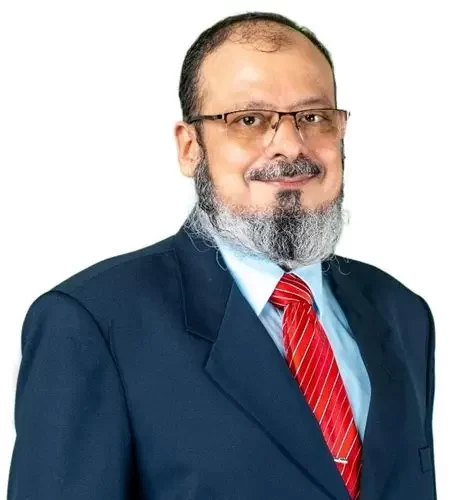
Shabbir H. Gheewala
Joint Graduate School of Energy and Environment (JGSEE),ThailandShabbir H. Gheewala is a professor at the Joint Graduate School of Energy and Environment (JGSEE), Thailand where he teaches Life Cycle Assessment and has led the Life Cycle Sustainability Assessment Lab for almost 25 years. His research focuses on sustainability assessment of energy systems; sustainability indicators; circular economy; and certification issues in biofuels and the agro-industry. He is a national expert on life cycle inventory as well as product carbon and water footprinting in Thailand. He mentors the research network on sustainability assessment and policy for food, fuel and climate change in Thailand.
With over 350 papers in peer reviewed journals, he is the Specialty Chief Editor of Quantitative Sustainability Assessment at Frontiers in Sustainability, and on the editorial boards of Sustainable Production and Consumption (Elsevier), Energy Nexus (Elsevier), International Journal of Life Cycle Assessment (Springer), and a host of other journals.
Along with graduate teaching and research, Shabbir has worked extensively with industry in Thailand providing training and consultancy to scores of companies with aspirations towards improvements in sustainability. He also sits on several national committees providing technical support to policy-making bodies in Thailand. He has conducted national projects on sustainability and competitiveness for several critical supply chains in Thailand with the support of agencies such as the National Science and Technology Development Agency (Ministry of Science and Technology), Agricultural Research and Development Agency, Department of Alternative Energy Development and Efficiency (Ministry of Energy) and the National Research Council of Thailand.
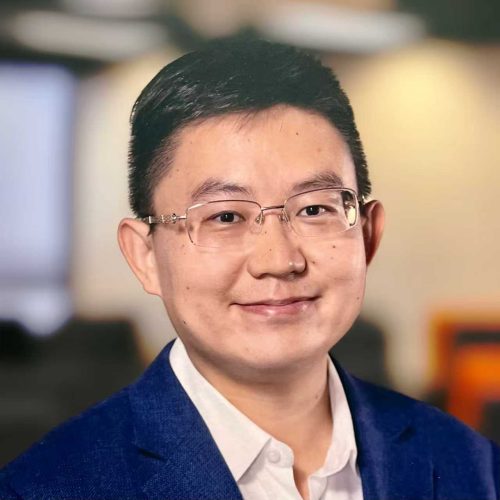
Guojun He
Director, HKU-Jockey Club Enterprise Sustainability Global Research InstituteGuojun HE is an economist working on environmental, development, and governance issues. Currently, he is the Hong Kong Jockey Club Professor in Economics at the University of Hong Kong (HKU). He serves as the director of HKU-Jockey Club Enterprise Sustainability Global Research Institute, the director of HKU Business School’s Shenzhen ESG Research Institute, and the associate director of HKU’s Institute of China Economy. He holds a concurrent appointment at the Energy Policy Institute of the University of Chicago (EPIC) and leads research activities of its China center (EPIC-China). He is a co-editor of Journal of Environmental Economics and Management, an associate editor of Management Science and serves on the editorial board of American Economic Journal: Applied Economics.

Llewelyn Hughes
Australian National University, AustraliaDr. Hughes is a Professor at the Crawford School of Public Policy, Australian National University (ANU) and senior consultant in energy & environment for GR Group, a government affairs and public policy consultancy headquartered in Tokyo. His academic work is on how public policies affect, and are affected by, the low-carbon energy transition, with a particular focus on the Asia-Pacific region. An ongoing project examines how the rise of Global Value Chains affect the ability of governments to promote green growth industries. Before joining the ANU Dr. Hughes worked at the Elliott School of International Affairs at George Washington University (GWU) in Washington DC, and before that the Consortium for Energy Policy Research at the John F. Kennedy School of Government, Harvard University. He has also been a visiting fellow at the Institute of Advanced Sustainability Studies in Potsdam, the Environmental Policy Research Centre (Forschungszentrums für Umweltpolitik) at Freie Universität, the Centre of Geopolitics of Energy and Raw Materials (CGEMP) at Université Paris Dauphine, Tokyo Foundation, Japan Business Federation (Keidanren), and the Japan Institute for Energy Economics (IEEJ).
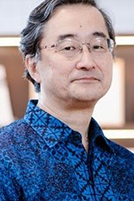
Fukunari Kimura
President, IDE-JETROProf. Fukunari Kimura is currently Professor Emeritus and Senior Professor, Keio University and President, Institute of Developing Economies, Japan External Trade Organization. He received his Bachelor of Laws from the Faculty of Law, University of Tokyo in 1982. He then received Master of Science and PhD titles from the Department of Economics, University of Wisconsin-Madison in 1990 and 1991, respectively. He worked for the Department of Economics, State University of New York at Albany as Assistant Professor in 1991-1994, and in the Faculty of Economics of Keio University as Associate Professor and Professor in 1994-2024. He was also Chief Economist, Economic Research Institute for ASEAN and East Asia in 2008-2024. He has been active in writing academic/semi-academic books and articles on international production networks and economic integration in East Asia.
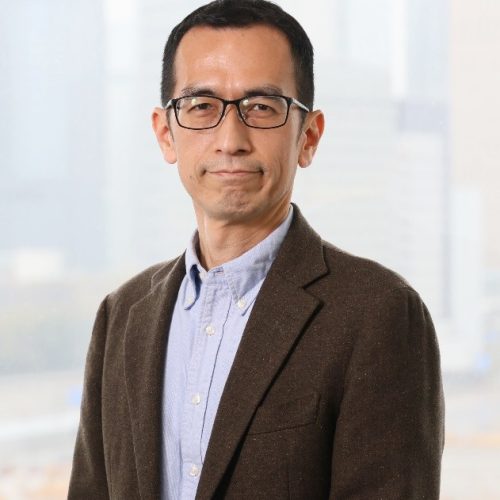
Ichiro Kutani
Director, Energy Security Unit, The Institute of Energy Economics, JapanMr. Kutani has been engaged in energy policy analysis since joining IEEJ in 2007; his main field of research is analysis of global energy market and energy security issues with emphasis on Asia. The latest study project engagement includes development of energy master plan for Bangladesh, Japan-Germany joint study on energy transition, and ASEAN Power Grid study. He delivered lectures and presentations on variety of topics including the global geopolitical landscape, the energy transition, and emerging security risks related to clean technology and critical minerals. He provided testimony to the Upper House Committee on Natural Resources, Energy and Sustainable Society in Japan in 2023. Prior to his current role, Mr. Kutani has held positions of Leader of Gas Group at IEEJ. Mr. Kutani began his career at JFE Engineering Corp. where he honed his mechanical engineering skills. He holds a Master’s Degree in Mechanical Engineering from Waseda University, Japan.
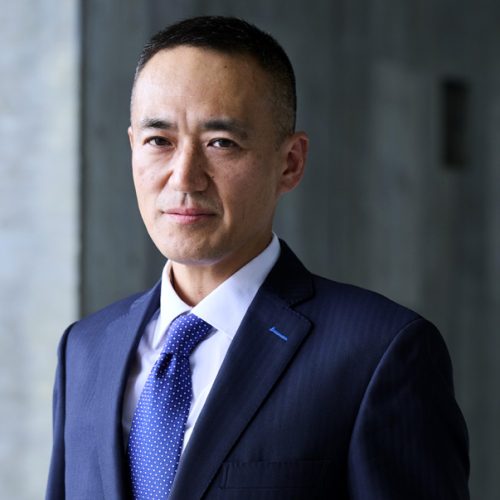
Shunsuke Managi
Distinguished Professor of Technology and Policy, Director, Urban Institute, Kyushu UniversityShunsuke Managi is the Distinguished Professor of Technology and Policy, Director of Urban Institute & Director of Yunus & Shiiki Social Business Research Center at the Kyushu University, Japan. Managi’s research has provided evidence for the value of sustainability measurement focusing on urbanization, transportation, energy, climate change, and population change. He is a director for Inclusive Wealth Report 2018 (IWR 2018) and IWR2023 & 2024, ISC working group member for UN’ The Global Sustainable Development Report 2023, member of UN Network of Economic Statisticians – Round Table on Measuring Capitals for Sustainability, a lead author for the Intergovernmental Panel on Climate Change (IPCC), a coordinating lead author for the Intergovernmental Platform on Biodiversity and Ecosystem Services (IPBES), a coordinating lead author UNESCO International Science and Evidence based Education Assessment, lead author of Policy Briefs T20 for the Presidency of G20 in 2022 & 2023 & task force member of T20 2024 Communiqué, an editor of “Economics of Disasters and Climate Change”, “Environmental Economics and Policy Studies” and on the editorial board for nine journals including Journal of Cleaner Production, and is the author of “Technology, Natural Resources and Economic Growth: Improving the Environment for a Greener Future” and editor of “Encyclopedia of Energy, Natural Resource, and Environmental Economics” and “The Routledge Handbook of Environmental Economics in Asia”. He is the co-chair the Scientific Committee of the 2018 World Congress of Environmental and Resource Economists. In 2020 he was elected as a council member of the The Science Council of Japan. He was the recipient of a JSPS Prize and selected in Clarivate World’s Influential Researchers in Highly Cited Researchers.

Chris Nelder
Manager, Energy Transition Show, USAChris Nelder is an energy analyst, journalist, and investor, who consults and lectures on energy investing and policy. During a decade of studying energy, he has written two books on investing and energy Profit from the Peak and Investing in Renewable Energy, as well as over 900 blog posts and articles.
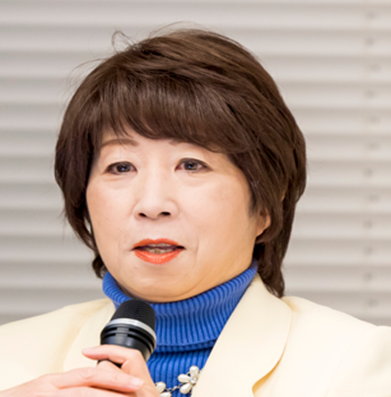
Sayuri Shirai
Professor at the Faculty of Policy Management, Keio UniversitySayuri Shirai is a Professor at the Faculty of Policy Management, Keio University. She is also an Advisor on Sustainable Policies at the Asian Development Bank Institute (ADBI). In this capacity, she founded and leads the ADBI–ADB Asian Climate Finance Dialogue project, which promotes information exchange and enhanced understanding of climate-related disclosures and financial policies among financial regulators and central banks across Asia. In 2024, she also served as a Senior Consultant to the Asian Development Bank. Her previous advisory roles include serving as Advisor to the Nissin Oillio Group and the Nomura Research Center for Sustainability. She also served as Senior Advisor at EOS at Federated Hermes in London in 2020–2021, where she provided ESG stewardship services to listed companies in Japan. From 2011 to 2016, she was a Member of the Policy Board of the Bank of Japan. She has published extensively on topics such as central bank digital currency, monetary policy, global finance, and ESG investment. She is also a contributing writer to the Japan Times and a frequent Japanese and international media commentator on Japan’s economy and global monetary policies. She holds a PhD in economics from Columbia University.
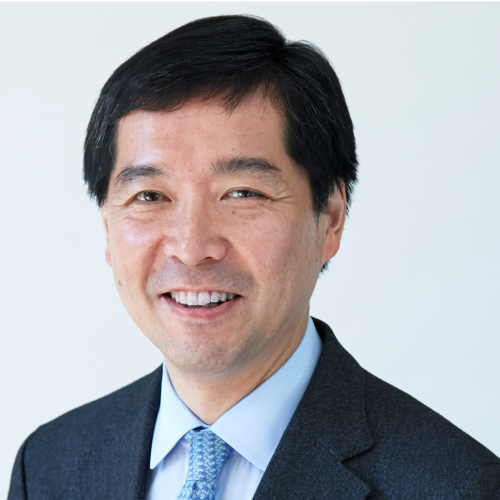
Hideaki Shiroyama
Professor, Graduate Schools for Law and Politics, Graduate School of Public Policy, The University of TokyoHideaki SHIROYAMA is a professor of public administration at the Graduate School of Public Policy and a professor of the Graduate Schools for Law and Politics, The University of Tokyo. He is the former Dean of the Graduate School of Public Policy from 2014 to 2016 and the former Director of Policy Alternatives Research Institute from 2010 to 2014. He also serves as the Director of the Institute for Future Initiatives of the University of Tokyo from 2021 to 2023. His research focuses on international administration, science, technology and public policy, and public policy process. He serves various committee and advisory councils at Ministry of Education, Science, Technology, Culture and Sports, Ministry of Economy, Trade and Industry, Ministry of Foreign Affairs, Cabinet Office, Cabinet Secretariat in Japan’s government.
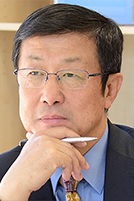
Xiansheng Sun (孙贤胜)
Chairman, ISETS Council; Former Secretary-General, International Energy Forum (IEF)Dr. Xiansheng Sun is the Chairman of the International Society for Energy Transition Studies (ISETS) and previously served as the fourth Secretary-General of the International Energy Forum. He has extensive experience with the China National Petroleum Corporation (CNPC), where he played a pivotal role in negotiating and signing numerous collaborative contracts for projects both domestically and internationally. Additionally, Dr. Sun served as President of the CNPC Research Institute of Economics and Technology (RIET), the corporation’s think tank, until the end of 2015.

Nobuo Tanaka
Co-Chair, ISETS Council; Executive Director Emeritus, International Energy Agency (IEA)Nobuo Tanaka is the Executive Director Emeritus of the International Energy Agency (IEA) and currently serves as Chairman of the steering committee for the Innovation for Cool Earth Forum (ICEF). As IEA’s Executive Director (2007-2011), he led the collective release of oil stocks in 2011. Beginning his career in 1973 at Japan’s Ministry of Economy, Trade, and Industry (METI), he held key roles, including Director-General of the Multilateral Trade System Department. As Minister for Industry, Trade, and Energy at Japan’s Embassy in Washington DC, he addressed major US-Japan trade issues. He also twice served as Director for Science, Technology, and Industry at the OECD in Paris. Now CEO of Tanaka Global Inc, he advises Japanese and international companies.
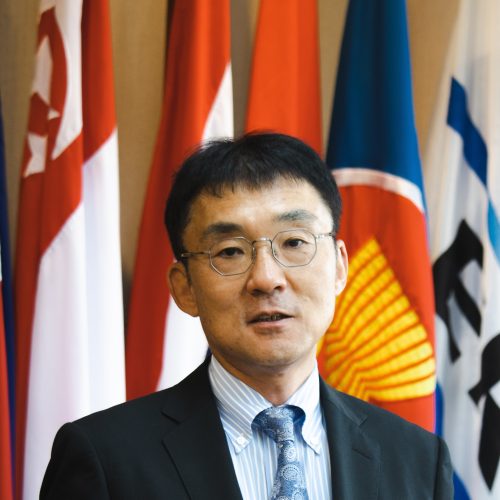
Tetsuya Watanabe
President, Economic Research Institute for ASEAN and East Asia (ERIA)Mr. Tetsuya Watanabe is President of the Economic Research Institute for ASEAN and East Asia (ERIA). With over 30 years of experience in international trade, economic policy, and regional cooperation, he has held key leadership positions at Japan’s Ministry of Economy, Trade and Industry (METI), including Director General for Trade Policy and Director General of the Multilateral Trade System Department. He also served as Special Advisor to the Minister of METI and Vice President of the Research Institute of Economy, Trade and Industry (RIETI). In academia, he was a Visiting Professor at the University of Tokyo’s Graduate School of Public Policy. Mr. Watanabe earned his B.A. in Law from the University of Tokyo and his LL.M. from Columbia Law School. Throughout his career, he has been a strong advocate for multilateralism, sustainable economic development, and regional integration across ASEAN and East Asia.

Matthew Wittenstein
Chief of Section for Energy Connectivity, United Nations Economic and Social Commission for Asia and the Pacific (UN ESCAP)Matthew Wittenstein is Chief of Section for Energy Connectivity at the UN ESCAP. He supports member State efforts to improve the energy system sustainability and security through increased power system integration, and by developing secure and sustainable value chains for critical raw materials. Previously, Matthew was Senior Electricity Analyst at the International Energy Agency. From 2011 to 2014, he was a Fellow at the US Department of Energy. He holds a Master of International Affairs from Columbia University, with a concentration in international economic policy.
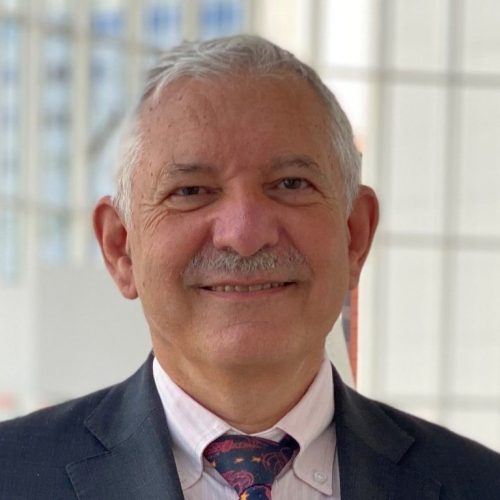
Christophe Xerri
President, The Sailing Brain Consulting; Former Director of the Division of Nuclear Fuel Cycle and Waste Technology, International Atomic Energy Agency (IAEA)Christophe Xerri is an internationally recognized expert in the fields of energy, nuclear fuel cycle, and radioactive waste management, bringing more than 30 years of global experience to his current role as President and Senior Consultant at The Sailing Brain Consulting. His current focus includes nuclear energy, critical raw material and multi-cultural management. He is supporting the work of UNECE.
Prior to founding The Sailing Brain Consulting, Xerri held a distinguished career with the International Atomic Energy Agency (IAEA). He served as Director of the Division of Nuclear Fuel Cycle and Waste Technology, where he led numerous international peer reviews and missions, including evaluations of Japan’s progress in decommissioning the Fukushima Daiichi Nuclear Power Station after the 2011 nuclear accident. Xerri’s earlier career includes service as the Nuclear Counsellor at the Embassy of France in Japan, where he was involved in policy and strategic engagement on nuclear affairs, and a career in the industry.
Xerri graduated from Ecole Centrale de Lyon engineering school, France; holds a MSc from Salford University, UK; and a MBA from HEC-MBA, France.
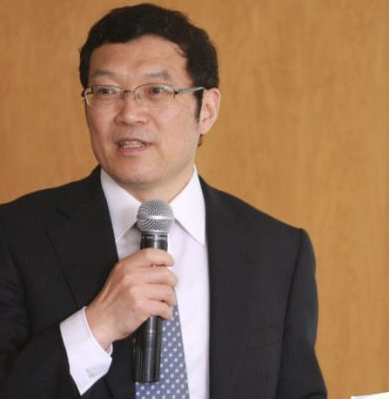
Jinjun Xue
Nagoya University, JapanDr. Jinjun Xue is a Professor at Economic Research Centre of Economics of Nagoya University, Japan. He held careers of Fulbright Scholar at Economic Growth Centre of Yale University in USA, Professor and Deputy Dean of Economics School of Wuhan University, Associate Professor of Hitotsubashi University and Professor of Oita University), Japan, visiting Professor at University of Oxford etc. He is also a visiting Researcher at Tsinghua University, Chinese Academy of Sciences, Wuhan University and so on.
His major is Development Economics and the current research subjects are Global Income Inequality, Labour Migration, Global Value Chains and CO2 Emissions and the Chinese Economy; He published many books in English, Japanese and Chinese, and papers in Science, Nature Communications, Applied Energy, Energy Economics, China Economic Review etc. Currently he serves as a guest editor of Applied Energy, Singapore Economic Review and reviewers of many international journals.
Xue Jinjun is the author of China’s first textbook of Development Economics, the author of the first book entitled Low Carbon Economics, one of the founders and co-director of the first research institute named after the “low carbon economy”, one of the initiative members of Beijing Humboldt Forum.
He is one of the first scholars who advocated China’s implementation of export-driven economic growth, proposed a low-carbon development model, and actively participated in China’s low-carbon city design and carbon market construction. He also has many publications on labor migration and income distribution China.
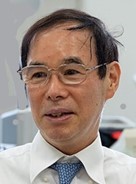
Naoyuki Yoshino
Keio University, JapanDr. Naoyuki Yoshino is Professor Emeritus at Keio University, Tokyo, Japan. From 2014 to 2020, he was Dean & CEO of the Asian Development Bank Institute (ADBI). He obtained his Ph.D. from Johns Hopkins University (United States) where his thesis supervisor was Sir Alan Walters, economic adviser to former British Prime Minister Margaret Thatcher. Dr. Yoshino has been a visiting scholar at the MIT (United States) and a visiting professor at various universities including the University of New South Wales (Australia), Fondation Nationale des Sciences Politiques (France), the University of Gothenburg (Sweden) and Martin Luther University of Halle-Wittenberg (Germany). He has also been an assistant professor at the State University of New York at Buffalo (1979-1981), an associate Professor at GRIPS (National Graduate Institute for Policy Studies, 1982-1990) and an economics professor at Keio University (1991-2014). Dr. Yoshino’s professional career includes membership in numerous government committees. He was named Director of the Japan Financial Services Agency’s (FSA) Financial Research Center (FSA Institute) in 2020. He was appointed as Chair of the Financial Planning Standards Board in 2007. He served as Chairperson of the Japanese Ministry of Finance’s Council on Foreign Exchange as well as its Fiscal System Council (Fiscal Investment and Loan Program Section). Additionally, he was a Board Member of the Deposit Insurance Corporation of Japan and President of the Financial System Council of the Government of Japan. He was nominated for inclusion in Who’s Who in the World for 2009, 2013, and 2020. He was awarded honorary doctorates from the University of Gothenburg (Sweden) in 2004, Martin Luther University of Halle-Wittenberg (Germany) in 2013 and received the Fukuzawa Award in 2013 for his contribution to research on economic policy. He served as the T20 Japan, Lead-chair during Japan’s Presidency of the G20-2019 meeting and the Lead Co-chair of the T20 Infrastructure Financing Task Force. He handed over T20 presidency of Japan to Saudi Arabia’s presidency in 2020 and Italy’s Presidency in 2021. He received the International Green Finance Lifetime Achievement Scientific Award from the Central Bank of Hungary which was held at the Planet Budapest 2021 sustainability EXPO summit. He is a member of Economic Advisory Group (EAG) of Republic of Palau in 2022-2024.
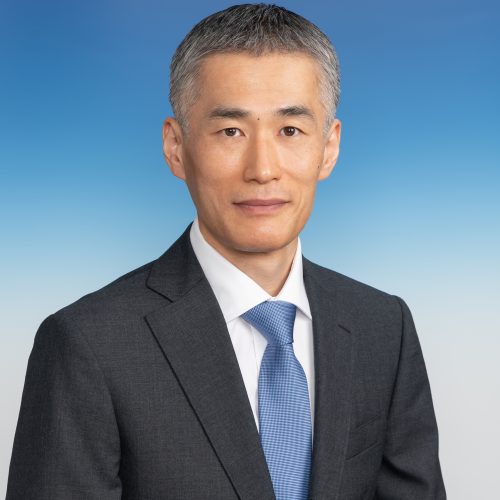
YOKOSHIMA Naohiko
President of the New Energy and Industrial Technology Development Organization (NEDO), JapanMr. YOKOSHIMA Naohiko was appointed as President of the New Energy and Industrial Technology Development Organization (NEDO) in October 2023. Prior to joining NEDO, Mr. Yokoshima spent most of his career as a legal and legislative officer at the Ministry of Economy, Trade and Industry, where he held various director positions, amongst them with the Minister’s Secretariat, the Small and Medium Enterprise Agency, and the Agency of Natural Resources and Energy. During his career in public service, Mr. Yokoshima served at several other government agencies including the Japan Patent Office, the Prime Minister’s Office, and the Ministry of Agriculture, Forestry and Fisheries. Mr. Yokoshima also worked at the Japanese Delegation to the OECD as First Secretary, where he covered trade and industrial policy.
Mr. Yokoshima earned an LLB from the University of Tokyo in 1994 and an LLM from New York University in 2000. He also studied public relations at the Institute of Socio-Information and Communication Studies, University of Tokyo from 1992 to 1994, and international relations at Columbia University East Asian Institute in 2001.
Publication Opportunities
Journal Special Issues
Authors may also develop their work for one of our curated Special Issues. Current Calls (Tentative):
-
Geopolitics and Global Collaboration for Decarbonization: Perspectives on Climate Governance, Green Finance, and Green Development
-
Journal: Economic Analysis and Policy (SSCI)
-
Guest Editors: Prof. Xunpeng Shi (UTS), Prof. Feng Wang (Chongqing University), Prof. Jian Yu (CUFE), Dr. Yi Jin (MUST)
- Submission Deadline: 31 January 2026
-
-
Navigating Socioeconomic Complexities in the Global Energy Transition
-
Journal: Frontiers in Environmental Science (SCI)
-
Topic Editors: Dr. Tsun Se Cheong (Hang Seng U.), Prof. Xunpeng Shi (UTS), Prof. Jian Yu (CUFE)
- Submission Deadline: 11 April 2026
- Submission: Frontiers | Navigating Socioeconomic Complexities in the Global Energy Transition
-
-
Science, Engineering, and Policy Innovations Driving the Global Energy Transition
- Journal: Energy Engineering (EI)
- Topic Editors: Prof. Xunpeng Shi (UTS), Prof. Fushuan Wen (Zhejiang Univeristy, IEEE Fellow), Asso Prof. Kaveh Khalilpour (UTS)
- Submission Deadline: 31 May 2026
- Submission: ENERGY | Special Issues: Science, Engineering, and Policy Innovations Driving the Global Energy Transition
🔔 Outstanding papers will also have the opportunity to be recommended for publication in the Journal of Chinese Economic and Foreign Trade Studies (SSCI). Considering that the number of submissions may be limited, we will not organize a separate special issue for this journal.
Please note: Participation does not automatically guarantee publication. All submissions must meet the standard requirements of the respective journals.
Important dates:
- Abstract submission deadline: 15 August 2025
- Notification of Acceptance: 20 August 2025
- Special Concurrent Session proposal deadline: 30 August 2025
- Early bird registration: 31 August 2025
- Registration deadline: 15 October 2025
- Conference: 28 Nov-1 December 2025
Submission Guide [Please use the templates]
Please note that all attendees (except for “Call for Special Concurrent Session” participants), whether making a presentation or not, need to go through the submission process.
Setp 1: Registration
Click on “LOGIN/REGISTER” on this conference website. Log in to your member portal. If you are new, you need to register. If you forget your password, please reset it. Your username is the one you chose during registration. You can also use your email address as your username.


Click on the “Personal Account” section in the upper right corner of the webpage. (If this is your first time registering, your personal name will be displayed as “[Empty Empty]” instead of your “[First name Given name]”. You only need to click on “ACCOUNT” in the “Personal Account” section to modify it.) Then, click on “My Events” to submit your paper and register for attendance. In “My Events,” select “The 2nd ISETS International Conference” under “AVAILABLE EVENTS” and click on “Register Now.”
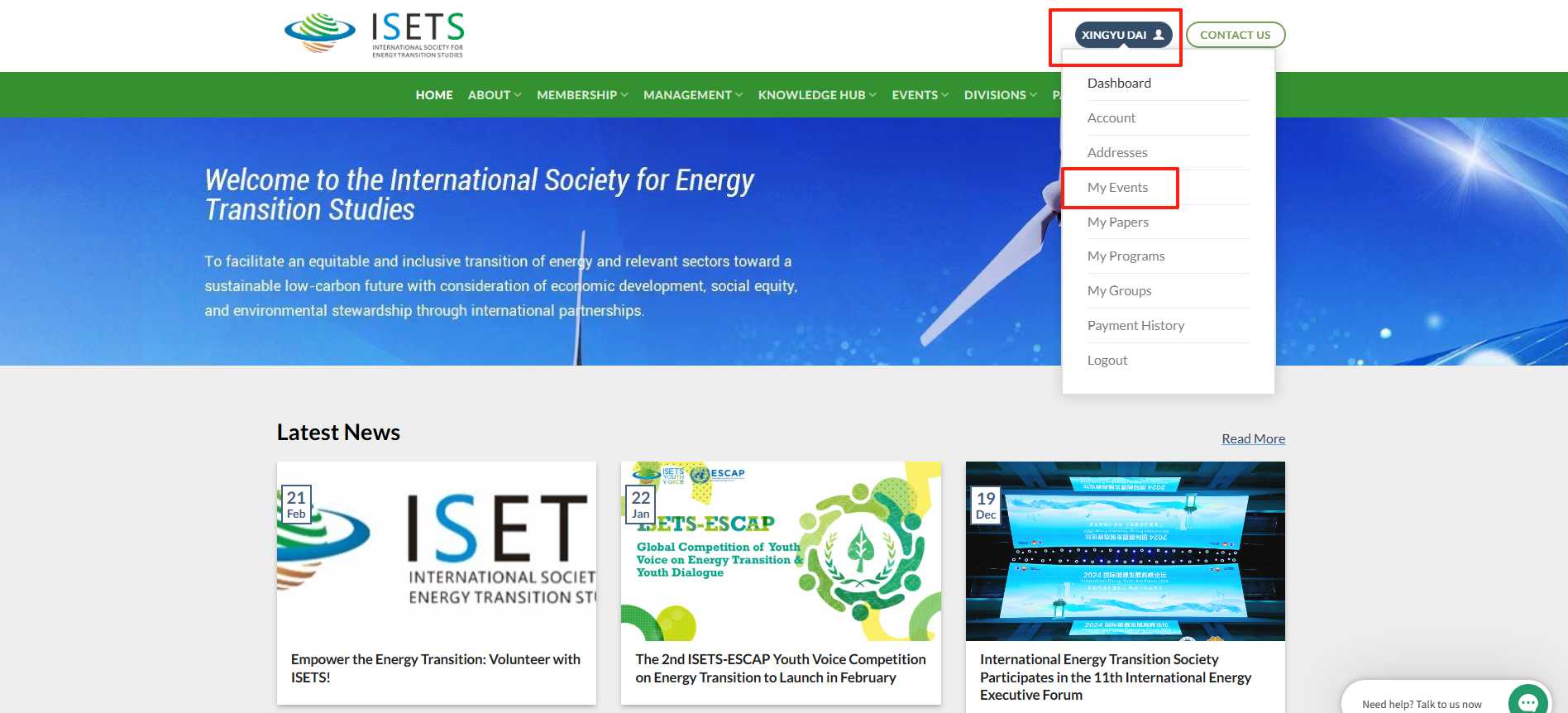

You need to refresh the webpage and click on “CURRENT EVENTS” in the “MY EVENTS” section. You will then find an additional event titled “The 3rd ISETS International Conference, Tokyo” If this event title does not appear, please refresh the webpage again until it does. Then, click on the blue button labeled “ADD SUBMISSION.”
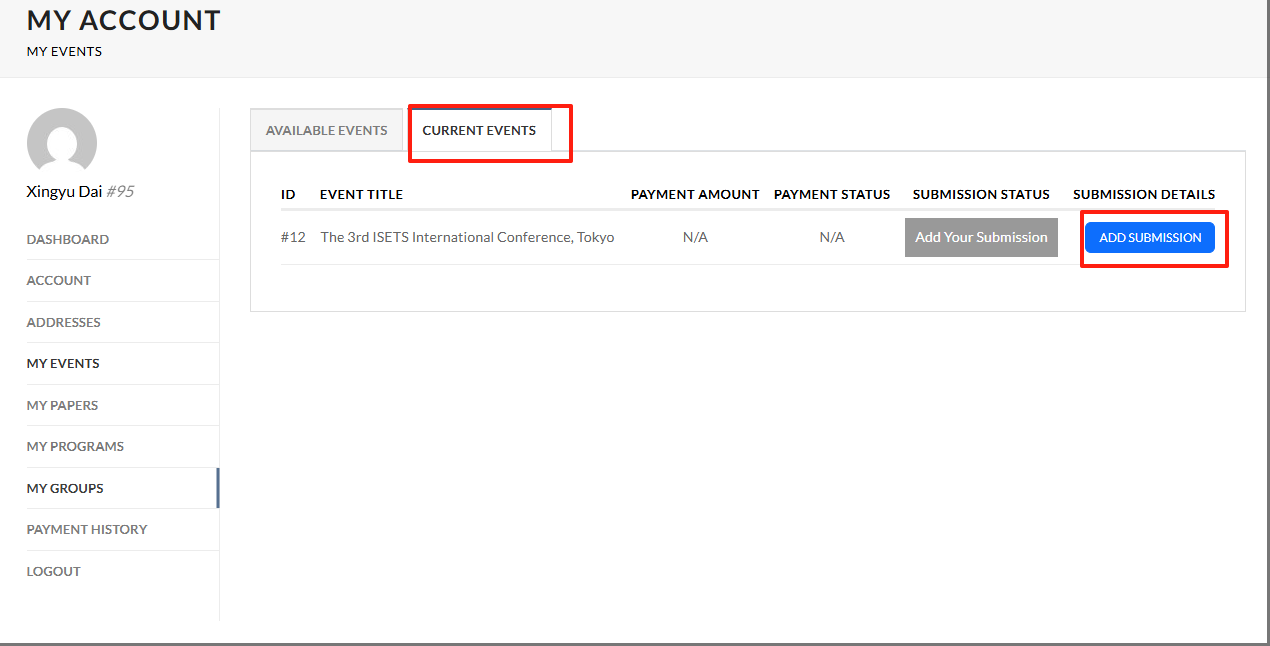
Setp 2: Step for individual participants who are only attending the conference without making a presentation
Please write down “I attend the 3rd ISETS International Conference without presenting” in the “Title” and “Abstract” blanks. Please also fill in the remaining blanks with your information.
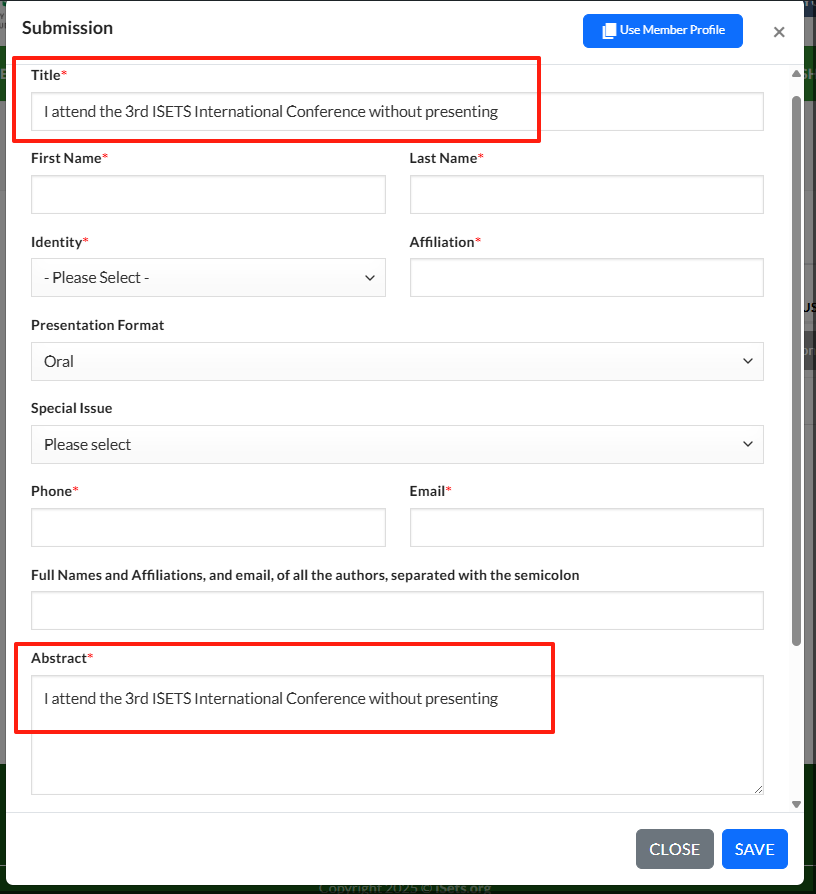
You may upload a blank (newly created) Word file in the “Files” field.

Once you have filled in all the submission information, click “SAVE” to complete the process.
Setp 3: Step for individual participants who are both attending the conference and making a presentation
Please complete all required information and submit your manuscript using the abstract template. If the download link for the Abstract Template does not appear, you can either refresh the webpage or click here to download it. Once you have filled in all the submission information, click “SAVE” to complete the process.
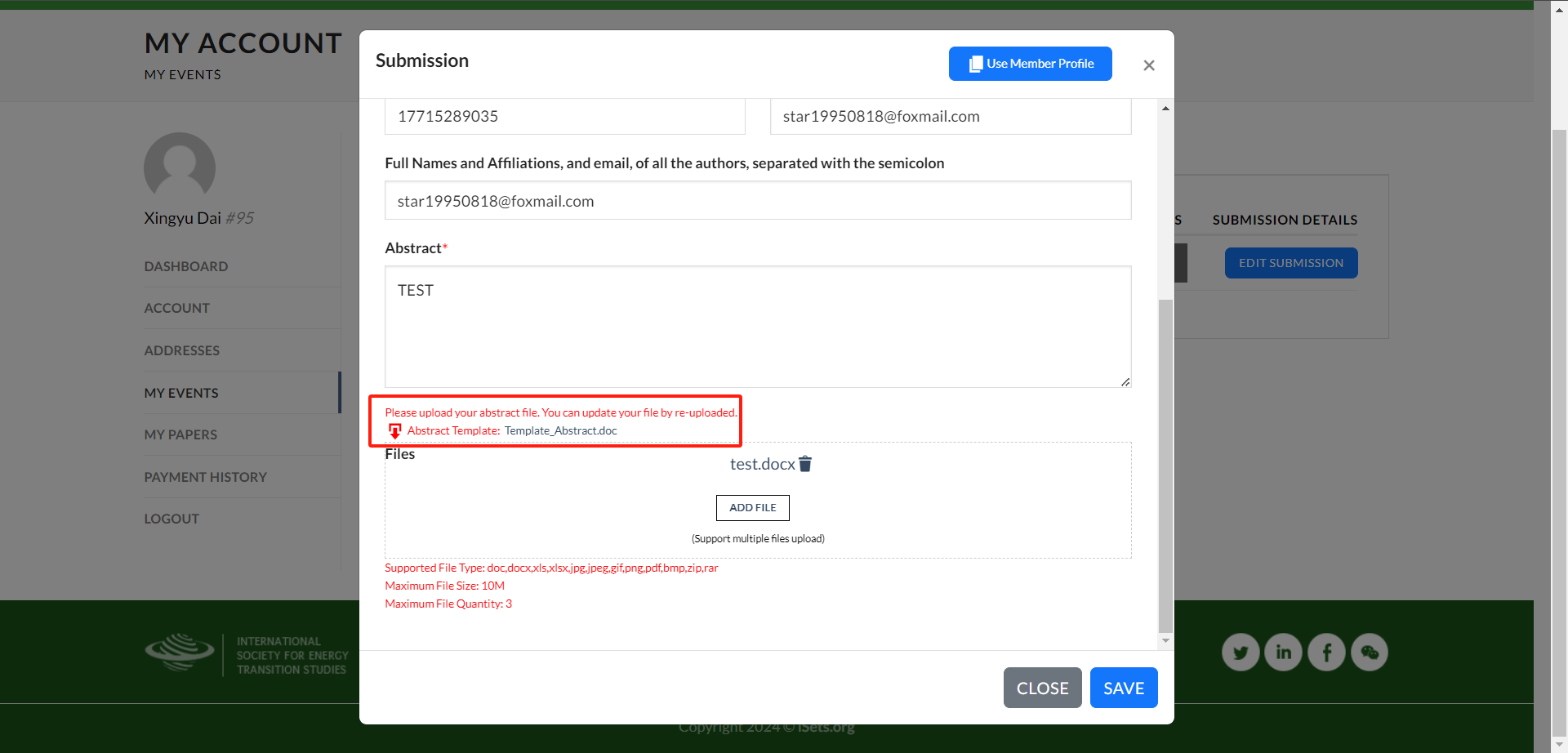
Setp 4: Pay the conference fee
After completing the submission information, the submission information in the “CURRENT EVENTS” section of your “MY EVENTS” column will be updated as shown in the figure below. The “SUBMISSION STATUS” will change to a gray “To be determined” button. At this point, the ISETS conference committee will review your submission and decide whether to accept or reject it.

After received an accepted email from ISETS2025 office. Your “SUBMISSION STATUS” will update to green “Approved”, and you can click “PAY NOW” to pay the conference fee. However, if you receive a rejected email from ISETS2025 office, you cannot find a “PAY NOW” button.

Please feel free to contact us when you meet any problems.
Contact Person: Dr Yanfang Zhang
Email: isets2025@hotmail.com
isets@isets.org
Please note that all attendees(except for “call for session” participants), whether making a presentation or not, need to go through the submission process. Please see the Submission Guide column firstly.
Registration Fees for Conference Participation:
- Scholars: 800 AUD
- Students: 600 AUD (To be eligible for this student rate, please submit documents/ID that confirm your student status to isets2025@hotmail.com before your payment. Please specify the email address you registered with in the conference submission system.)
- Early bird discount: 100 AUD (31 August 2025)
Important Guidelines:
- Advance Payment Required: All registration fees must be paid in advance. Please note that onsite registration will not be available.
- Paper Inclusion in Program: To include a paper in the conference program, at least one author must register by 15 September 2024. For multiple accepted submissions, a different author is required to register and present each paper. Failure to comply will necessitate the withdrawal of one or more papers.
- Student Status Verification: Full-time students (excluding post-doctoral researchers) must provide proof of their status, such as a valid student ID card or a letter from the head of their institution or program director.
- Payment Methods: Fees should be paid online. In exceptional cases, payment via Bank Transfer can be arranged.
I. Bank Transfer
Bank: National Australia Bank
BSB (bank, state, branch): 082-356
BIC/SWIFT code: NATAAU3303M
Account number: 909690445
Beneficiary name and address: International Society for Energy Transition Studies, 5 Barraba Place, Bella Vista, NSW 2153, Australia.
When making a bank transfer payment, please include the attendee’s name in the Remittance Information. After completing the payment, log in to the system with your account, fill out the registration form, and upload a photograph or scanned copy of the remittance.
II. QR Code payment
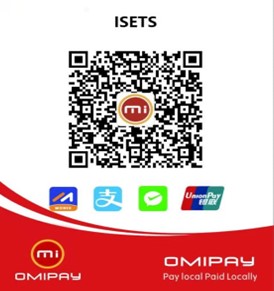
When using QR code payment, please write the attendee’s conference registration email and name on the message board. Send the payment confirmation screenshot to isets2025@hotmail.com, and include the attendee’s conference registration email and name in the email.
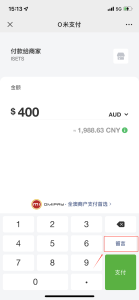

Cancellations Policy
Once the registration fee is confirmed, no refunds can be issued from the original payment under any circumstances. However, if you are unable to attend, you may transfer your fully paid registration to another member of your organization. This substitution is allowed until September 30, 2025.
The Third ISETS International Conference
Welcome to Tokyo
Tokyo, Japan’s vibrant capital, is a dynamic metropolis where cutting-edge innovation meets centuries-old tradition. As one of the world’s leading global cities, Tokyo offers a unique blend of futuristic infrastructure, historical landmarks, and a deeply rooted cultural heritage. Known for its efficient public transport, world-class hospitality, and exceptional safety, Tokyo is an ideal destination for international conferences and academic gatherings.
Beyond its urban sophistication, Tokyo is home to tranquil gardens, ancient temples, and a UNESCO-recognized culinary scene. Whether you’re exploring the bustling streets of Shibuya, the historic charm of Asakusa, or the academic hubs of Bunkyo and Chiyoda, the city offers endless opportunities for inspiration and discovery.
As a global leader in technology and sustainability, Tokyo provides an exceptional backdrop for critical dialogue on energy policy and engineering. We look forward to welcoming you to this dynamic city at the crossroads of tradition and innovation.
Visa & Entry
Transport from Airports
Tokyo is served by two international airports: Haneda and Narita. Both are well connected to the city center via a wide range of public transport options, including trains (operated by multiple companies), buses, and taxis. Note that taxi fares, especially from Narita, can be very costly.
- Haneda Airport: https://tokyo-haneda.com/en/access/index.html
- Narita Airport: https://www.narita-airport.jp/en/access/
Visa Requirements
Please confirm visa requirements with your local Japanese embassy. The Visit Japan Web service allows travelers to complete immigration and customs procedures online and generate a QR code for faster clearance. This service also enables tax-free shopping for foreign visitors.
- Visit Japan Web: https://services.digital.go.jp/en/visit-japan-web/
- Additional reference: https://www.ceac.net/visa.html
Important Travel Note
Importing meat, sausages, and fresh vegetables into Japan is strictly prohibited and regularly checked at customs (including by sniffer dogs).
Getting Around Tokyo
Public Transport
Tokyo’s public transport system is highly developed, particularly its rail network. However, it’s important to note that services are operated by multiple companies with different fare structures. Transfers between networks may incur additional costs.
You can purchase single tickets or use smart cards like PASMO and SUICA, which can be recharged at most stations (note: many machines do not accept credit or QR payment).
- Japan Guide: https://www.japan-guide.com/e/e2017.html
- JR East: https://www.jreast.co.jp/multi/en/
- Tokyo Metro: https://www.tokyometro.jp/en/index.html
- Toei Subway: https://www.kotsu.metro.tokyo.jp/eng/services/subway.html
- Major Rail Map: PDF map
Apps & Maps
Recommended mapping and route-planning tools:
- Google Maps – Real-time public transit and walking directions
- Yahoo Japan Maps – Local app with rich data
- Japan Transit Planner (Jorudan/Navitime): https://world.jorudan.co.jp/mln/en/
Taxi & Ride-Hailing
Ride-hailing apps like Uber or Grab primarily book regular metered taxis (with a service fee).
- Go Taxi: https://go.goinc.jp/
Bus Services
- Toei Buses: https://www.kotsu.metro.tokyo.jp/eng/services/bus.html
- Limousine Bus (including airport routes): https://www.limousinebus.co.jp/en/
Bicycle Sharing
- Docomo Bike: https://docomo-cycle.jp/?lang=en
- LUUP: https://luup.sc/en/embed/
- Hello Cycling: https://www.hellocycling.jp/
Currency & Payment
International credit cards are widely accepted, though some small shops still prefer cash. QR payments are growing in popularity but may vary depending on the location and app.
- PayPal is widely used
- Alipay and WeChat Pay are accepted in many stores (but not all)
- Tax-Free Shopping Info: https://www.mlit.go.jp/kankocho/tax-free/page01_000113.html
Climate & Weather
Tokyo in November–December offers cool, comfortable weather with average temperatures that are not too hot or cold. Rain is possible but less frequent than during Japan’s rainy season.
What to pack:
- Layered clothing
- A warm coat or jacket
More info: JAL Travel Guide – Weather in Japan
Electricity
- Voltage: 100V
- Frequency: 50Hz (Eastern Japan, including Tokyo)
- Plug Types: A (2 flat pins) and B (3 pins, less common)
Most electronic devices with universal adapters should work fine.
More info: https://www.japan-guide.com/e/e2225.html
The 3rd ISETS International Conference, 28 November-1 December 2025, Tokyo
Program Overview
|
28 November 2025 |
|||||||||||||||||||
|
14:00 –19:00 |
Conference Registration Venue |
||||||||||||||||||
|
14:50 –19:00 |
Pre-conference workshop (registration is essential) Theme: tbc Venue: University of Tokyo Hongo Campus |
||||||||||||||||||
|
16:00 –18:00 |
Committee and Council Meeting (Exco and Council Member only) |
||||||||||||||||||
|
29 November 2025 |
|||||||||||||||||||
|
9:00 – 12:30 |
Opening Sessions Plenary Sessions |
||||||||||||||||||
|
13:30 – 17:00 |
Thematic Plenary Sessions Concurrent sessions |
||||||||||||||||||
|
17:00 – 18:00 |
Annual General Meeting |
||||||||||||||||||
|
17:30-20:30 |
Conference Reception & Networks Dinner Venue: University of Tokyo Hongo Campus |
||||||||||||||||||
|
30 November 2025 |
|||||||||||||||||||
|
9:00 – 10:30 |
Plenary Sessions |
||||||||||||||||||
|
10:30 – 17:00 |
Thematic Plenary Sessions Concurrent sessions |
||||||||||||||||||
|
1 December 2025 |
|||||||||||||||||||
|
9:00 – 17:00 |
Fieldwork (Participants are requested to arrive at Sendai Station on their own. Registration is essential.)
|
||||||||||||||||||
Conference Address
Location
University of Tokyo – Hongo Campus
- Official website: https://www.u-tokyo.ac.jp/150ut/en/index.html
- Campus info: https://www.u-tokyo.ac.jp/en/whyutokyo/hongo_index.html
- Campus map: PDF
- Accessibility: PDF
Nearest Stations
- Hongo-sanchome Station (Marunouchi and Oedo Lines) – Closest to the venue
- Todaimae Station (Namboku Line) – ~10-15 minute flat walk
- Additional options (longer walks, with slopes): Kasuga and Ueno Stations
Accommodation
Nearby Hotels (5–10 min walk to campus)
- Forest Hongo
Address: 6-16-3 Hongo, Bunkyo-ku, Tokyo 113-0033
TEL: +81-3-3813-4408
Website: https://forest-hongo.jp/ - Hotel Kizankan
Address: 4-37-20 Hongo, Bunkyo-ku, Tokyo 113-0033
TEL: +81-3-3812-1211
Website: https://kizankan.co.jp/
Additional Options
Kasuga / Korakuen Area
- Tokyo Dome Hotel
Address: 1-3 Koraku, Bunkyo-ku, Tokyo 112-0004
TEL: +81-3-5805-2111
Website: https://www.tokyodome-hotels.co.jp/ - Toyoko Inn Tokyo Korakuen Bunkyokuyakusho Mae
Address: 2-2-11 Koishikawa, Bunkyo-ku, Tokyo 112-0002
TEL: +81-3-3818-1045
Website: https://www.toyoko-inn.com/eng/search/detail/00081
Ueno Area
- Mitsui Garden Hotel Ueno
Address: 3-19-7 Higashi-Ueno, Taito-ku, Tokyo 110-0015
TEL: +81-3-3839-1131
Website: https://www.gardenhotels.co.jp/ueno/eng/
